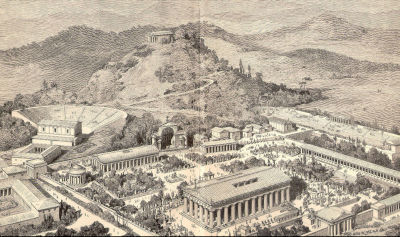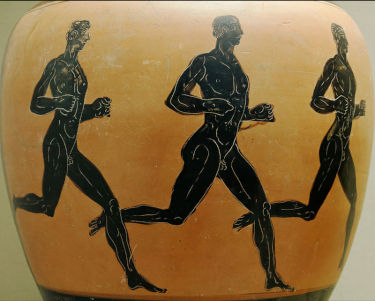Every professional athlete dreams of competing in the Olympics one day. They are the worlds foremost sports competition and provide a stage for the best athletes in the world, representing more than 200 nations. But perhaps even more significant is the so called ‘Olympic spirit’. Since all these athletes from various cultural and social backgrounds compete with each other peacefully, the Olympic Games themselves perfectly display the ideas of peace, fair contest and respect for pluralism.

In order to truly understand how the Olympics became the greatest sport event in the modern world and where the famed Olympic spirit originates we have to look back to the year 776 BC in ancient Greece. The Games were held every four years in the site Olympia in a valley on the Peloponnese, adjoining Mount Kronos. The site consisted of several Temples and of course the locations for the different disciplines such as the stadium and the palaestra. However Olympia was only inhabited when the Games took place, which is why residential buildings were lacking and visitors had to dwell in tents. From the remains of paintings on ancient vases we know that in the first Olympics in 776 BC there was but a single event, the stade. Contestants were sprinting on a straight line for 192 metres and the victor was honoured with an olive leaf wreath or crowns. As the Greek philosopher Xenophanes wrote “Victory by speed of foot is honoured above all”. As the years passed more and more disciplines such as boxing, wrestling, several cart races and a long distance race (Dolichos) were added to the program of the Ancient Olympic Games.
In the ancient world the Olympic Games were not simply an athletic event but also had a huge political and cultural significance. Parallel to the athletic competition there was an artistic competition of poets, sculptors and painters ,who honoured the most successful athletes of the Games with their work. A widely unknown characteristic of the ancient Olympics is their religious importance. Towering over Olympia a 13 meter tall golden and ivory statue is meant to honour Zeus, the head of the Greek pantheon. This statue actually is one of the seven wonders of the ancient world. In ancient Greece there were constant political tensions between the numerous city-states frequently resulting in conflicts and wars which proved to be problematic for the Olympics. That’s why the famed ekecheiria was established. Before each Olympics three Runners announced the beginning of the ekecheiria in the participating city-states which prohibited armies from entering Olympia and postponed all legal disputes for the duration of the Games.

For more than 1000 years the ancient Olympics were a symbol for sport and culture in the Ancient world until supposedly the last Games took place in 393 AC under the roman emperor Theodosius I. In the middle age ancient culture fell into oblivion and so did the Olympic Games. Only after the Independence of Greece in the 19th century the idea of the Olympics was revived. In 1959 there were Games only with Greek and Ottoman athletes that were funded by the Greek businessman Zappas. 31 years later Baron Pierre de Coubertin who is nowadays know as “the father of the Olympics” founded the International Olympic Committee (IOC). In 1996 the IOC finally organised the first modern Olympics in Athens with international athletes who competed in 43 disciplines. Until today the IOC still organises the Olympics every four years, even tough their character changed due to commercialisation and many new disciplines.
Sources:
https://ioa.org.gr/the-olympic-spirit/
https://en.wikipedia.org/wiki/Ancient_Olympic_Games
